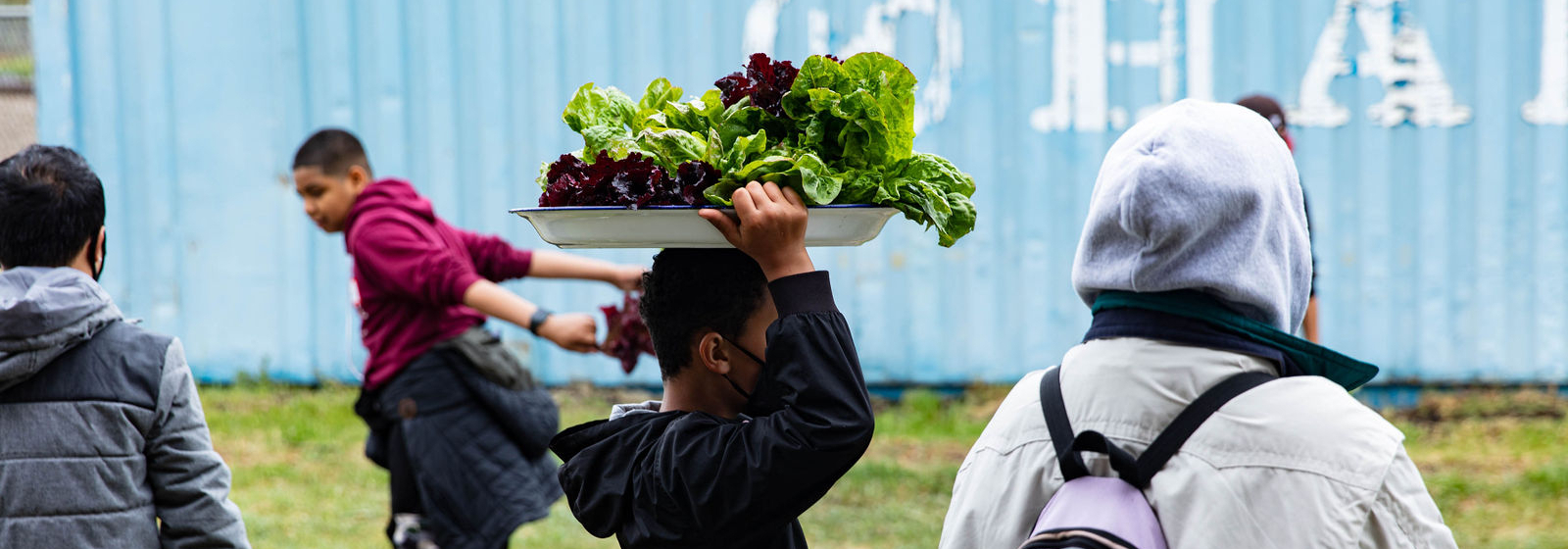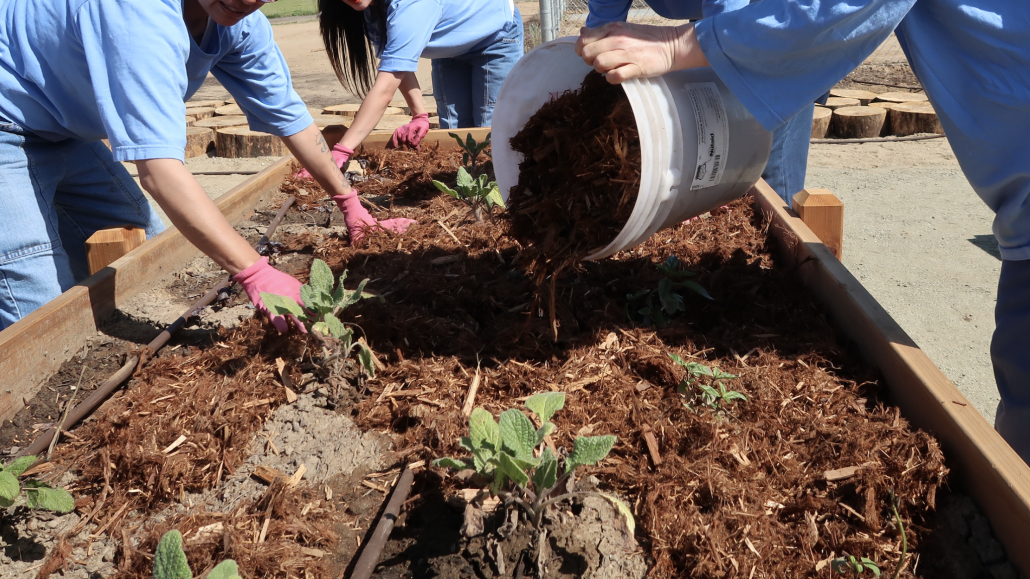Formerly incarcerated individuals sow seeds for personal growth
BACKGROUND
This story highlights how the Insight Garden Program, which receives funding from TCC, has helped incarcerated Stocktonians develop valuable stress management skills prior to their release from prison. This intervention is part of Stockton Rising’s broader Workforce Development and Economic Opportunities Plan, click here.
Interviews for this story were conducted in November of 2024.
DEANDRE FARLOW grew up in North Oakland but moved to Stockton in 2005, seeking safety and lower rent. At age 24, after four years of building a life in Stockton, he was arrested and incarcerated. He spent 12 years in prison.
After eight years in prison, Farlow learned about the Insight Garden Program, which is designed to help incarcerated individuals prepare for their release by teaching them skills to manage difficult emotions through gardening. The program has received funding through Stockton’s TCC grant as part of the initiative’s broader effort to connect Stockonians, including those who are incarcerated, with opportunities for economic mobility and professional advancement. Farlow began the program when he was in the Solano State Prison, having learned of it from a dorm mate. “My grandfather, when I was growing up, was living in Fresno. He would teach us how to garden, to grow fruit, to graft, to cross pollinate … so I was always interested in gardening.”
Though at first he thought the program was called “Inside Garden” because it was located inside of a prison, Farlow picked up on the insight element once he got started. The program includes activities, such as videos and walking, to help participants learn to meditate, manage conflict, and process emotions. After each exercise, the participants would reflect together on what they learned or thought about. “My main motivation was that I wanted to be a better human being — develop the tools to deal with the internal conflicts we all go through.”
The most beneficial thing I got from Insight Garden were tools to navigate extreme situations — like understanding that 99% of the time, altercations stem from a lack of effective communication.
True to its name, the program centered on gardening, allowing Farlow to further develop his childhood skills. The participants learned to transplant, prune, and examine plants to maintain their health. “We got our hands dirty. They taught us to transplant, to prune, to tell if the plant is sick. If something’s wrong, I may need to add eggshells to the soil for nutrients. Or the plant may be too alkaline, so we gotta add more water.”
Farlow participated in the year-long Insight Garden Program for about 10 months before he transferred to a different facility. Across all parts of the program, Farlow developed strategies he could use to manage difficult life situations. He described learning to manage conflict with others and developing patience, empathy, and understanding.
Upon his release, Farlow spent three months in a transitional home in Stockton before moving into the Bay Area Freedom Collective in Castro Valley, another transitional living facility. He soon started working at Five Keys, a justice-focused nonprofit that helps underserved communities gain education, employment, recovery, family, and community — the “five keys.” At Five Keys, Farlow works with unhoused individuals to access resources to get permanent housing. He uses the social and emotional skills he strengthened through the program to respond calmly to difficult interpersonal situations. “It’s because of the tools that I learned at Insight Garden, you know, that help me navigate that, to where I can keep my job,” he said. He also used his gardening skills to plant vegetables in the garden at one Five Keys housing site.
Supported by skills developed in the Insight Garden Program, Farlow is working toward an associate’s degree in cyber security, as well as an assistant director position at Five Keys. He aims to buy a house and land on which he can grow his own food.
AARON HARGROVE was born and raised in Stockton. Like Farlow, he has memories of gardening as a child — growing things with this grandmother and eating the food they grew, like tomatoes, peppers, and other vegetables. By his teenage years, however, Hargrove was swept up in the crack/cocaine epidemic and eventually ended up in prison.
In the last few years of his incarceration, Hargrove participated in multiple “self-help” groups. The Insight Garden Program was one of the first he applied to, having learned about the program from a flier on the wall. He applied in part for the self-help pieces of the program, though he wasn’t initially clear on what this entailed, as well as for the gardening experience. “I was trying to get back to doing something productive. The space they use will look like an eyesore if it’s not tended to. So I was trying to be a part of the solution, rather than the problem, and try to beautify the space.”
I learned to work with others. Some days you’re not going to get along with everybody, but some days you get out there with your hands and shovel, and before you know it, you’ve turned over a whole plot of land and accomplished something [together].
Hargrove grew across multiple dimensions throughout the program. He learned about plants and the local ecosystem, including how different plants thrive in different areas. He also learned to work collaboratively with others, to be patient and non-reactive, and to manage his emotions through meditation. These skills have helped him in his day-to-day life now that he has left prison.
Hargrove’s participation in the Insight Garden Program gained him not only skills but also earned him time-served credits that reduced his sentence. While the earned time option is not available for all, it enabled Hargrove to be released early.
Since his release, Hargrove has worked in several industries. He spent time as an industrial painter before transitioning into trucking, as painting was more physically demanding than he wanted his job to be. In each of these different endeavors, Hargrove says, the emotional management skills he developed in the Insight Garden Program have proven useful, helping him to work with others patiently.
Now working as a truck driver, Hargrove has particularly benefited from an increased capacity for patience. Navigating during the day and night on hectic highways, he has implemented breathing techniques that he learned in the program. “I got better at being patient and not being quick to react. Everybody’s going through something. It’s like: the garden was set up in aisles. Sometimes one aisle would do better than the other. Everybody would rush to tend the aisle that wasn’t doing so swell but neglect the one doing well. I’m learning to try to be even-keeled, to attend to everything a little bit and know that people in the world got issues, and you have to be real patient with people out here.”
In addition to this job, Hargrove has started the process of creating a non-profit organization. While the organization has yet to fully launch, when it does, Hargrove says it will be a mentorship program to help youth avoid some of the outcomes he has experienced. In the coming years, Hargrove hopes to purchase land, where he plans to build a home, raise chickens, and grow his own garden.
Top page photo:
Students participating in an educational event in March 2022 at the Edible Schoolyard Community Farm in Stockton
Credit: Erin Scott



